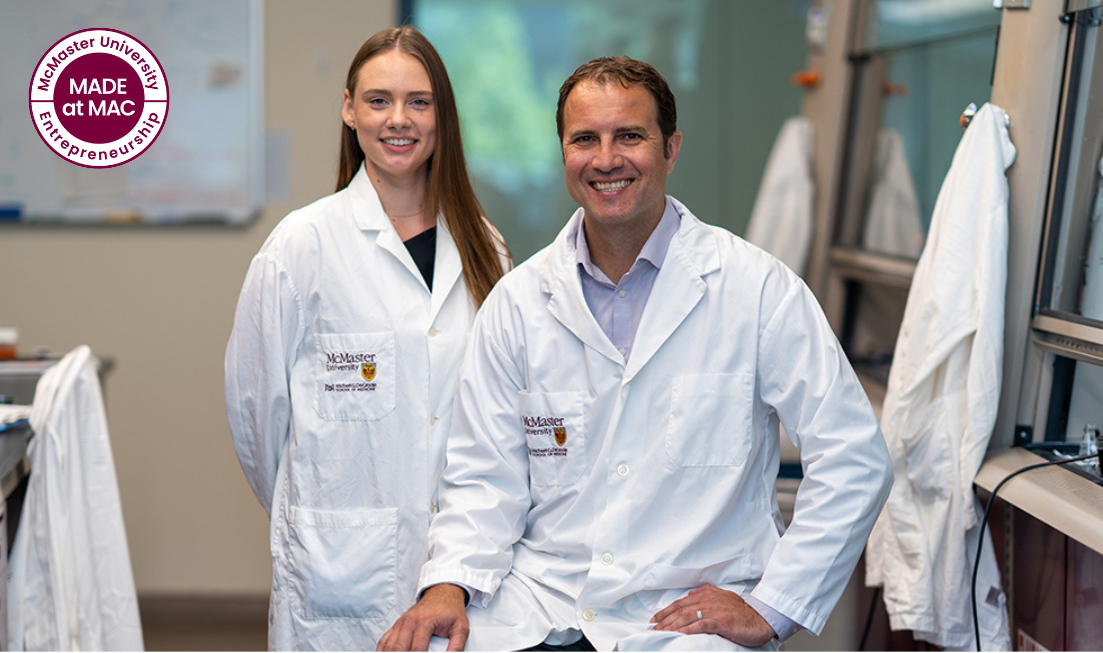Block Biosciences: McMaster startup aims to prevent cancer from spreading to the brain

Agata Kieliszek and Jakob Magolan are two of the McMaster researchers behind Block Biosciences, which is working on a first-in-class precision medicine that will prevent secondary metastatic brain cancer.
BY Blake Dillon
September 4, 2025
A McMaster startup is developing a treatment to prevent cancer from spreading to the brain, an innovation that could revolutionize the future of cancer care.
The Block Biosciences team is working on a first-in-class precision medicine that would be taken proactively by patients after a diagnosis of lung, breast or skin cancer, to prevent secondary metastatic brain cancer, which happens when cancer cells from another part of the body travel to the brain.
Block Biosciences was co-founded by McMaster professors Jakob Magolan and Sheila Singh, both executive members of the university’s Global Nexus, after their breakthrough research was published in the journal Cell Reports Medicine.
This study was the capstone work of McMaster student-turned-entrepreneur Agata Kieliszek. Her pioneering thesis research, co-supervised by Singh and Magolan, identified a major chink in the metastases’ armour — a critical vulnerability that, if exploited, could prevent cancer from spreading to the brain.
“Think of the cells that initiate brain metastasis as tiny ships voyaging toward your brain,” suggests Magolan, a professor in McMaster’s Department of Biochemistry and Biomedical Sciences, and head of Chemistry at Block. “We have figured out how to sink these ships while they’re in transit — and likely before they ever even set sail.”
Their artillery: small-molecule drugs that target a specific enzyme that is essential to the cancer cells that spread.
So, by designing and developing drugs that inhibit this enzyme, the company anticipates that it can reduce the risk of forming secondary brain metastases, one of the deadliest forms of brain cancer.
Ninety per cent of patients with metastatic brain cancer don’t survive beyond one year. The outlook is so poor because, despite its prevalence, treatment options for metastatic brain cancer remain limited, and none are curative.
“When we translate this research into novel therapeutics, these drugs will fundamentally transform the treatment paradigm for secondary brain cancers,” says Singh, a professor in McMaster’s Department of Surgery and Block’s Chief Scientific Officer.
“The work we’re doing at Block Biosciences has the potential to turn a universally fatal condition into an entirely preventable one.”
“Right now, over five million cancer patients are at risk of developing a secondary brain metastasis, and the standard of care is largely palliative,” adds Kieliszek, a McMaster graduate who is now head of Biology and Operations at Block Biosciences. “Our drug will allow more patients to not only survive cancer, but to reclaim their futures.”
With proof-of-principle studies complete, the company is now advancing its most promising drug candidates toward pre-clinical studies. Those candidates that pass through these early checks will proceed for further evaluation before finally entering first-in-human clinical trials — something that could happen in the next two to three years, says Magolan.
The company, which recently received $250,000 in McMaster seed funding, anticipates that, if all goes well, they’ll have a new medicine available to cancer patients by as early as 2033.
“We’re getting much better at curing primary cancers, but even when we do, people still succumb to secondary cancers in the brain,” explains Singh.
“If we can stop this from happening, cancer patients all across the world will experience better outcomes and live longer and happier lives.”


